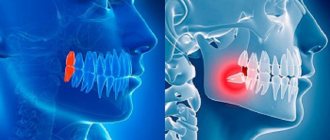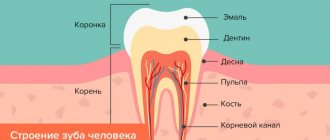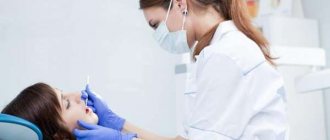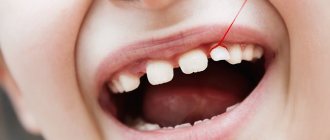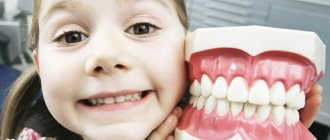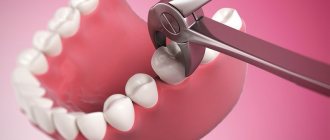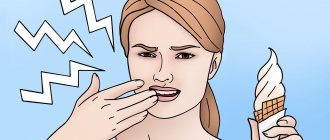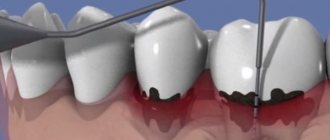Characteristics of the profession - what it does, functions and responsibilities
Let's see what specializations dentists have:
- The therapist is the doctor to whom you turn first. The general practitioner analyzes the general condition of the teeth. Finds problem areas, treats caries, removes nerves, puts fillings and restorations, and prepares teeth for prosthetics.
- The surgeon performs operations in the oral cavity: removes teeth, restores the jaw after injuries, prepares the oral cavity for implantation, prosthetics, orthodontic and orthopedic treatment. Deals with problems related to inflammatory processes, cysts and tumors.
- An orthodontist corrects malocclusion – a situation where the jaws do not close straight, but deviate to the right or left; corrects the curvature of the teeth - increased crowding, in which the teeth have “not enough space” and they run into each other or vice versa. The result of his work carries an important aesthetic point for the patient.
- Orthopedist – comes to the rescue when teeth are missing. Restores them with the help of dentures, removable or permanent, and fully reproduces the important chewing function. If it was possible to save a small part of the tooth, then it uses restoration technology using a crown. This doctor works in tandem with a dental technician - a specialist in the manufacture of dentures and prosthetic elements for a specific case.
- Hygienist is a relatively new field. Monitors the cleanliness of the oral cavity, carries out preventive and hygienic procedures to maintain oral health. Removes plaque, tartar, polishes enamel. Provides consultations regarding the prevention of dental diseases.
- Implantologist – specializes in restoring lost teeth using implants. Innovative technology allows you to install tooth analogues that are no different from real ones. Conducts a full examination, preparation in several stages and the implantation itself. Observes the patient throughout the entire period of rehabilitation after the intervention.
- A pediatric dentist is a doctor who deals with children's dental problems. Removes and treats baby teeth so that the molars develop healthy; puts fillings; fights oral diseases that children are prone to at an early age. A pediatric dentist should not be a doctor, but a kind wizard who will convince the child to treat his teeth and be able to perform all the manipulations without tears.
What a dentist should know and be able to do - personal qualities and skills
First of all, have a great desire to help people. There is no person who has never had a dental problem.
The doctor must find an approach to everyone, convey the need for the procedures performed and set them up for a positive outcome. Calm and support.
The profession is associated with the ability to work with a large amount of information at the initial stage; in the future, it is important to be able to successfully combine knowledge with practice. This is the basis for making a diagnosis - a decisive role in dental treatment.
A lot of daily work awaits the future specialist. The profession implies constant improvement and training, because modern dentistry does not stand still, new types of treatment appear every year.
Disciplines included in the course of study
The future specialist, in the process of mastering the program, studies the following subjects:
children's prosthetics;- endodontics;
- gerontostomatology;
- children's dentistry;
- cariesology;
- diseases of the mucous membrane;
- implantology;
- orthodontics;
- reconstructive surgery;
- diseases of hard dental tissues;
- clinical dentistry;
- anesthesiology;
- local anesthesia;
- propaedeutics;
- periodontology.
What subjects need to be taken
To enter the Department of Dentistry, students must pass mandatory exams in the subjects of biology and chemistry. An additional subject from the university and one of the applicant’s choice are also taken.
It is advisable to have at least a basic knowledge of Latin, which is the basis in medical terms. After 9th grade, you can go to college, where the requirements for OGE scores are much lower.
Admission conditions
The main objective of the course is to train a specialist who can take responsibility for the treatment of the patient. This involves performing specific practical tasks of varying levels of complexity, so you cannot do without theory and practice. What subjects must be passed successfully to be admitted to this major:
- chemistry (major exam);
- Russian language;
- biology/physics.
Which universities offer training in this specialty?
According to statistics, medical education in Russia is of the highest quality, and this is the key to a healthy nation. There are no special dental universities in our country.
Almost every medical school is recruiting for the Faculty of Dentistry. Depending on the chosen educational institution, different forms of education will be offered: full-time, part-time, evening.
You can enroll after 11th grade. This specialty is also offered by medical technical schools and colleges, which can be entered after completing 9 grades.
As a rule, all educational institutions have budget places. To take them, you need to have a high score on the Unified State Examination, otherwise the cost of training will fluctuate up to 400 thousand for leading universities in Moscow and St. Petersburg and on average up to 250 thousand in the regions. Education in technical schools and colleges costs an order of magnitude lower.
Where to apply
The popularity of the field is evidenced by the large selection of Moscow universities where you can get a specialist’s diploma in this field:
- State Classical Academy named after Maimonides;
- Russian National Research Medical. Pirogov University;
- Peoples' Friendship University of Russia;
- First Moscow State Medical University named after Sechenov;
- Moscow State Medical and Dental University named after Evdokimov.
How many years does it take to study to become a dentist?
The duration of study is 5 years to obtain theoretical knowledge; after the second or third year, students will have their first internship and a year of full-fledged internship in their future profession.
After receiving basic knowledge, applicants each go in their own direction.
Is it difficult to study? - applicants ask. As elsewhere, it all depends on interest, abilities and desires.
Career, places of employment
When the difficult period of study is over, the newly minted specialist awaits at least two more years of residency practice. This time is usually used to gain experience and outline options for future “adult” work. As a rule, young specialists go to paid clinics - general or highly specialized. Here the dentist is able to develop professionally and practically, improving his qualifications. Or he can go in the administrative direction and become the head or owner of his own clinic. Some also choose the scientific path: they remain teaching at a university with a small practice in some hospitals and go into theoretical and applied development.
Where can a dentist work?
Commercial dentistry is now leading the way in providing jobs. The state is pursuing a policy that supports medical workers, providing decent wages, high pensions and the opportunity to purchase subsidized housing.
This profession will always be popular and relevant, because every person has been a patient of a dentist for almost his entire life.
Career growth of a dentist
Dentists are divided into categories: first, second and highest. To confirm the first category, you need experience (three years), protection of the following categories after seven and ten years, respectively.
Confirmation is carried out before the commission with a report on the work done. To advance up the career ladder, you need to be a talented and hardworking doctor; your merits will not go unnoticed.
Is it worth studying to become a dentist - the pros and cons of the profession
The main thing is to have a great desire to treat patients’ teeth. Working with people is psychologically difficult, and the profession also involves enormous physical labor: working with your hands, in one position, under tension.
But it's worth it - nothing compares to the happy and grateful faces of patients.
Going to study based on the mere demand for a profession and fairly high wages is not entirely correct. It’s like an artist’s calling to become a musician, because they get paid more, even though he is only talented in drawing. It is better to find a profession you like and achieve success there.
Being a doctor is not only a calling; doctors take the Hippocratic oath, which says “do no harm.” This should be the basis when choosing the profession of a doctor, and a dentist - in the first place!
The dentist profession is quite in demand and is considered very prestigious. Dentists specialize in all problems related to the maxillofacial area; they are competent in modern diagnosis and treatment of teeth. The dentist often acts as a competent consultant in matters of disease prevention and proper oral care in general.
Who is a dentist: what do you need to know about the profession?
A dentist is a doctor who treats the teeth, jaw, soft tissues, or other organs of the oral cavity. The dental profession is a fairly broad concept, so specialists with a narrower profile are distinguished:
- The dentist treats caries, puts fillings, and restores teeth;
- dental surgeon – this focus involves diagnosing dental diseases using x-rays;
- orthopedist-dentist – a prosthetist who restores teeth and prevents the further development of various oral diseases;
- pediatric dentist.
In addition to dentists, dental technicians, orthodontists and medical assistants often work in clinics and dental offices. The duties of such an assistant include sterilizing dental instruments, conducting physical therapy procedures, preparing the office, and assisting the doctor in maintaining documentation.
Tasks and Responsibilities
Dentists have a wide field of activity, since the very concept of this specialty is quite capacious and is divided into several areas. Depending on them, the tasks and responsibilities of the doctor will vary. In a broader sense, the dentist's primary goal is to treat the patient's oral health.
Dentistry is a high-tech branch of medicine, so the doctor must be a master of various special equipment and instruments.
Work and salary
The dentist profession is prestigious, so the earnings of these specialists are quite high. Dentists can work in public clinics or in private offices.
The peculiarity of this profession is that there are several options for career growth. In the first case, the doctor can remain in the same position, constantly improving his qualifications and gaining experience. In addition, a dentist always has the opportunity to move up the administrative ladder and reach the position of chief physician. Also, a specialist can choose a scientific career and defend a doctoral dissertation, if desired, at the same time working for himself and improving his financial condition.
The average salary of a beginning specialist is about 30-40,000 rubles, while doctors with experience can receive from 100,000 rubles.
How to pass the examination for 200 points
How to pass the external examination in Ukrainian language and literature, biology and other subjects for 200 points? Firstly, preparation should begin at least 2 years before the exam in order to practice more. If it didn’t work out in advance, then you need to focus on the sections with the most questions. Usually the most tasks are on the syntax and morphology of the language.
You also need to practice writing an essay, because it gives the most points. Although you should not focus on it - in medical and polytechnic universities it is more important to write with the least number of errors.
It is more effective to prepare together with friends: explain topics to each other, organize competitions to test your knowledge of the subject. Special associative sentences also help memorization. For example, which consonants are voiceless? The sentence will help: “TsAP KhoChe FISTASHKI” - the corresponding letters are highlighted here.
It is worth taking tests from previous years - they can be found on the Internet on educational sites.
Psychological advice: on the day before cancer you need to relax. Relax, spend time with family or friends. Then look through all the topics at a glance. This way you will remember the questions with which you started preparing. It is also important to go to bed on time to get a good night’s sleep - this will give you more strength during the exam.

